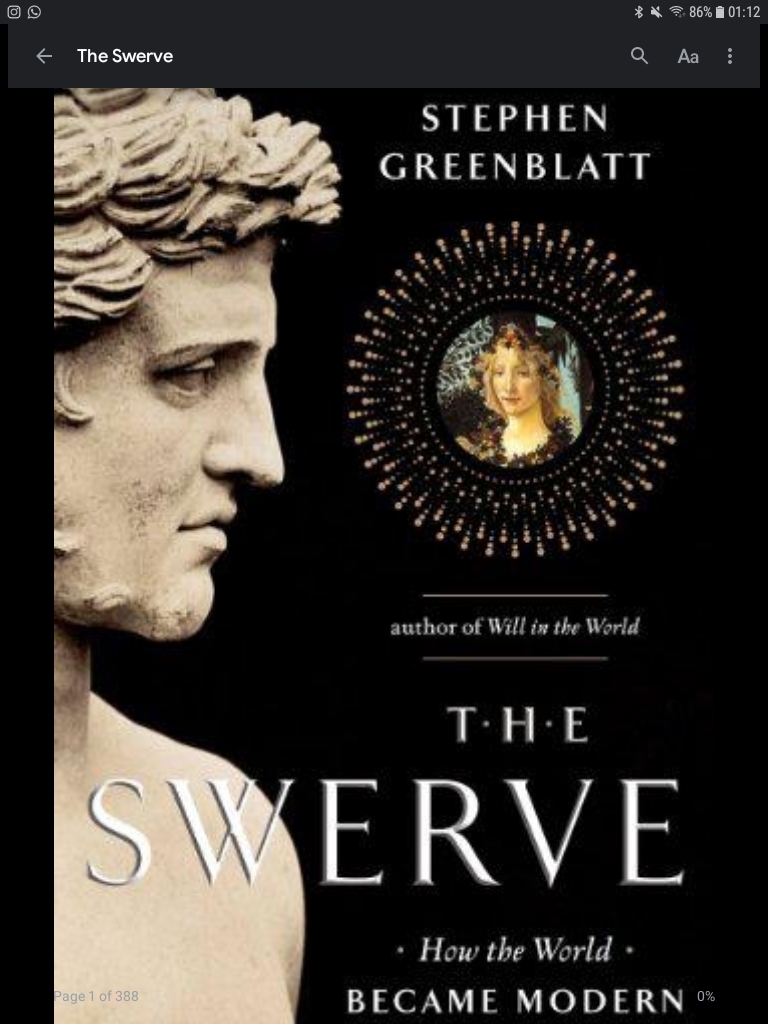Image is a screenshot by yours truly.
“There was a time in the ancient world – a very long time – in which the central cultural problem must have seemed an inexhaustible outpouring of books. Where to put them all? How to organize them on the groaning shelves? How to hold the profusion of knowledge in one’s head? The loss of this plenitude would have been virtually inconceivable to anyone living in its midst.
Then, not all at once but with the cumulative force of a mass extinction, the whole enterprise came to an end. What looked stable turned out to be fragile, and what had seemed for all time was only for the time being.”
Stephen Greenblatt’s highly praised survey of the European Renaissance is what happens when you mix literary imagination and historical fact and try to turn what should have been a solemn work of research into a novel.
There. I said it.
Greenblatt deserves due praise for making the dry annals of history a living brook again, but there may be reason that thorough academic work is a desiccated corpse not suited for easy reading.
History is muddied. It tells you about everyday life. Sure, it’s the everyday life of long dead, somewhat important figures, but it’s still their everyday life.
What I mean to say is, history is a let down in that there are no clear goodies or baddies – not, at least, when you look at the details. And the details really do matter.
For instance, every pop history book will tell you that Caligula was a crazy tyrant; none mention that most of his antics might have actually been satirical demonstrations at the expense of senators and the roman elite, as classicist and historian Mary Beard suggests in this article.
Those little nuances of history are invisible to the pop history reader, yet they matter immensely for the purpose of truth. Pop history acts as a well-intentioned introduction to a period in history, and it works marvelously when it acts as a carrot on a stick to draw the reader into further research on the subject. The problem arises when people read books like this and believe that they know all there is to know about the medieval ages, and then apply it willy-nilly to all their academic research and further writing.
Greenblatt’s Pulitzer prize-winning book has been criticized by a host of medieval scholars for his portrayal of the middle ages as the dystopian outcome of pleasure-hating Christian dogma and practices. While there existed a particularly curious affinity for masochism amongst the Christians of that age, it was far from being as widespread as Greenblatt has made it out to be. Self-flagellants weren’t found everywhere, popping up on street corners like monsoon frogs.
Mortification of the flesh was never a central tenet of Christianity as much as decadence was not the central tenet of Epicureanism. And for every St. Benedict throwing himself into the briars, there was a Chaucer poking fun at society and embedding all manner of sexual innuendos in his works. If that is not refutation enough for Greenblatt, let him read the prolific medieval Catholic cycle plays, popular among the laity to demonstrate the fact that even within religious constraints, there was humor and a leaning on the lighter side of life.
Greenblatt also makes the mistake that is a surprisingly juvenile slip-up for an academic of his pedigree. He makes his hypothesis very obvious within the first chapter of his book. To say that the widespread consumption of Lucretius’s De Rerum Naturae brought about the renaissance is all well and good, but where are the arguments in support of this? Where is the proof of the pudding?
Greenblatt relegates the very last chapter to exploring the actual influence Lucretius had on literary figures through references in their own work – and the evidence is pretty slim. It only proves, for instance, that Thomas Moore, Michel de Montaigne and Shakespeare read Lucretius, not that they thought the world of him.
In addition to this, Greenblatt neglects the large loophole in his theory: if it was the rediscovery of the poem that brought about the renaissance, what was it that motivated Poggio and other book-hunters like him to search through monasteries for manuscripts? If the zeitgeist of the Renaissance had already stirred the scribes into action, did the poem actually have as much of a role to play as Greenblatt asserts that it did?
Criticism aside, the book is immensely readable as a window into the life of Poggio Braccolini and his contemporaries. Just remember that if you choose to follow down the path that Lady History beckons, you’ll need both the bird’s and the worm’s eye view: the devil is in the details when it comes to historical facts.
